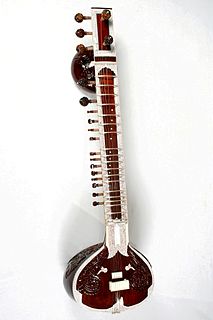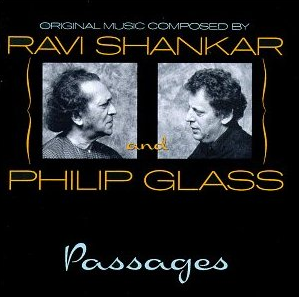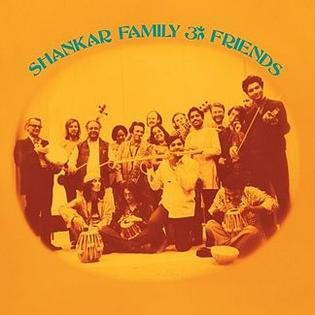
The sitar is a plucked stringed instrument, originating from the Indian subcontinent, used in Hindustani classical music. The instrument flourished under the Mughals, and it is named after a Persian instrument called the setar. The sitar flourished in the 16th and 17th centuries and arrived at its present form in 18th-century India. It derives its distinctive timbre and resonance from sympathetic strings, bridge design, a long hollow neck and a gourd-shaped resonance chamber. In appearance, the sitar is similar to the tanpura, except that it has frets.

Ravi Shankar, whose name is often preceded by the title Pandit (Master) and "Sitar maestro", was an Indian musician and a composer of Hindustani classical music. He was the best-known proponent of the sitar in the second half of the 20th century and influenced many other musicians throughout the world. Shankar was awarded India's highest civilian honour, the Bharat Ratna, in 1999.

Raga rock is rock or pop music with a pronounced Indian influence, either in its construction, its timbre, or its use of Indian musical instruments, such as the sitar and tabla. In addition, rock music from the 1960s and 1970s that incorporates South Asian musical influences and instruments, along with Western ideas of the Indian subcontinent, is often regarded as raga rock.

Anoushka Shankar is an Indian sitar player and composer. Her father is Ravi Shankar, her mother is Sukanya Rajan. She is the half-sister of Norah Jones.

Rise is an album by Anoushka Shankar released on 27 September 2005. The album was chosen as one of Amazon.com's Top 100 Editor's Picks of 2005 (#82). On previous recordings, Anoushka Shankar had followed in the footsteps of her father, Ravi Shankar, by performing relatively traditional, raga-based music. Rise, by contrast, incorporated jazz, pop, and pan-ethnic world music textures in an unpredictable melange. At the center of it all are Shankar's sitar expertise and traditional Indian roots.
Gourd Music is a record label featuring acoustic instrumental music with various ensembles of guitar, cello, flute, oboe, harp, fiddle, hammered and mountain dulcimer, banjo and mandolin.
William Coulter is an American Celtic guitarist, performer, recording artist, and teacher. Since 1981 he has explored the world of traditional music as a soloist with ensembles including Isle of Skye, Orison, and the Coulter-Phillips Ensemble.

Passages is a collaborative chamber music studio album co-composed by Ravi Shankar and Philip Glass, released in 1990 through Private Music. Consisting of arrangements by each of the composers around themes written by the other, the album's content is a hybrid of Hindustani classical music and Glass' distinct American minimal contemporary classical style. The album reached a peak position of number three on Billboard's Top World Music Albums chart.
John Barham is an English classical pianist, composer, arranger, producer and educator. He is best known for his orchestration of George Harrison albums such as All Things Must Pass (1970) and for his association with Indian sitar maestro Ravi Shankar. Barham trained at the Royal College of Music and the School of Oriental and African Studies in London, before establishing himself during the mid 1960s as a composer of piano interpretations of Indian classical ragas. He became a student of Shankar, for whose East–West collaborations with Yehudi Menuhin and others he transcribed Indian melodies into Western musical annotation. Through Shankar, Barham began a long friendship with Harrison in 1966, then a member of the Beatles, which assisted Harrison's own education in Indian music as well as his promotion of the genre to Western audiences. Barham collaborated with Harrison on the latter's Wonderwall Music soundtrack album (1968), before providing the orchestral arrangements for All Things Must Pass songs such as "Isn't It a Pity" and "My Sweet Lord", and for Harrison's 1973 album Living in the Material World.
"Marwa Blues" is an instrumental by English rock musician George Harrison. It was released on his final studio album, Brainwashed, in November 2002, a year after his death, and subsequently on a single as the B-side of "Any Road". The song is a slide guitar instrumental and named after Raga Marwa, an Indian classical raga traditionally played at sunset. "Marwa Blues" won the 2004 Grammy Award for Best Pop Instrumental Performance. Along with "Any Road" and the Brainwashed track "Rising Sun", it was also included on the 2009 compilation album Let It Roll: Songs by George Harrison.
Ravi Shankar had numerous solo recordings published, including these:

East Meets West Music is the official recording label of the Ravi Shankar Foundation. With access to the sitar master's personal archive of thousands of hours of live performance audio, film footage, interviews, and studio masters, EMWMusic provides unique access for the listener. In addition to Ravi Shankar's personally selected source material from the archive, EMWMusic also hopes to provide a platform for new artists, projects, and collaborations.

Full Circle: Carnegie Hall 2000 is a live album by Indian musician and composer Ravi Shankar, released in 2001 through the record label Angel Records. Recorded at Carnegie Hall in October 2000 as part of a tour with Shankar's daughter Anoushka, the album contains five tracks and presents two ragas. The concert occurred sixty-two years after Shankar's first performance at Carnegie Hall and commemorated his eightieth birthday; the album was his first live recording in nearly twenty years. Full Circle was produced by Hans Wendl, mastered by Scott Hull, and mixed and engineered by Tom Lazarus. Featured are performances by Tanmoy Bose and Bickram Ghosh on tabla, and Anoushka and Ravi on sitar.

Shankar Family & Friends is an album by Indian musician Ravi Shankar, recorded primarily in Los Angeles during the spring of 1973, but not released until late 1974. It was produced by Shankar's friend George Harrison and one of the first releases on the ex-Beatle's Dark Horse label. Out of print for many years, and much sought after as a result, the album was remastered in 2010 and reissued as part of the Ravi Shankar–George Harrison box set Collaborations.
The Living Room Sessions Part 1 is an album by Ravi Shankar released in 2012 through the record label East Meets West. The album earned Shankar the Grammy Award for Best World Music Album.

"I Am Missing You" is a song by Indian musician Ravi Shankar, sung by his sister-in-law Lakshmi Shankar and released as the lead single from his 1974 album Shankar Family & Friends. The song is a rare Shankar composition in the Western pop genre, with English lyrics, and was written as a love song to the Hindu god Krishna. The recording was produced and arranged by George Harrison, in a style similar to Phil Spector's signature sound, and it was the first single issued on Harrison's Dark Horse record label. Other contributing musicians include Tom Scott, Nicky Hopkins, Billy Preston, Ringo Starr and Jim Keltner. A second version appears on Shankar Family & Friends, titled "I Am Missing You (Reprise)", featuring an arrangement closer to a folk ballad.

Chants of India is an album by Indian musician Ravi Shankar released in 1997 on Angel Records. Produced by his friend and sometime collaborator George Harrison, the album consists of Vedic and other Hindu sacred prayers set to music, marking a departure from Shankar's more familiar work in the field of Hindustani classical music. The lyrical themes of the recorded chants are peace and harmony among nature and all creatures. Sessions for the album took place in the Indian city of Madras and at Harrison's home in Henley-on-Thames, Oxfordshire, following his work on The Beatles' Anthology (1995). Anoushka Shankar, John Barham, Bikram Ghosh, Tarun Bhatacharaya and Ronu Majumdar are among the many musicians who contributed to the recording.

West Meets East is an album by American violinist Yehudi Menuhin and Indian sitar virtuoso Ravi Shankar, released in Britain in January 1967. It was recorded following their successful duet in June 1966 at the Bath Musical Festival, where they had played some of the same material.

Tana Mana is an album by Indian musician Ravi Shankar, originally credited to "the Ravi Shankar Project" and released in 1987. The album is an experimental work by Shankar, mixing traditional instrumentation with 1980s electronic music and sampling technology. Shankar recorded much of Tana Mana in 1983 with sound effects innovator Frank Serafine, but it remained unreleased until Peter Baumann, head of new age record label Private Music, became attached to the project. The album title translates to mean "body and mind".

Ananda Shankar is the debut album by Indian musician Ananda Shankar, the son of dancer and choreographer Uday Shankar and the nephew of Indian classical musician Ravi Shankar. It was released in 1970 on the Reprise record label. The album fuses Indian music with Western rock and electronic music, and was among the first works in the rock genre by an Indian musician. Consisting mainly of instrumental recordings featuring sitar and Moog synthesizer, it includes a cover version of the Rolling Stones' 1968 hit song "Jumpin' Jack Flash" and a thirteen-minute Indian-style piece titled "Sagar ".












